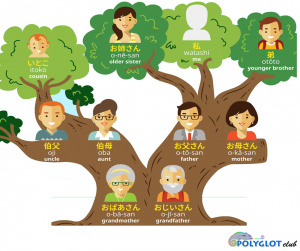Language/Japanese/Vocabulary/Family
Hello Japanese learners! 😊
In this lesson, you will learn how to write and pronounce the family members in Japanese. Family is an essential part of Japanese culture, and understanding the vocabulary related to it will help you communicate better with native speakers.
Family is said : Kazoku 家族
After mastering this lesson, you can also explore other related topics such as Japanese numbers, Japanese bird names, and Japanese nature vocabulary. These lessons will further expand your knowledge of the Japanese language and help you become more fluent. Enjoy your learning journey! 🌸
Direct Relatives[edit | edit source]
This first table describes the members of your own family:
| Male family members | Female family members | ||||
|---|---|---|---|---|---|
| Grandfather | 祖父 | Sofu | Grandmother | 祖母 | Sobo |
| Father | 父 | Chichi | Mother | 母 | Haha |
| Uncle | 叔父 | Oji | Aunt | 叔母 | Oba |
| Husband | 夫 | Otto | Wife | 妻 | Tsuma |
| Older brother | 兄 | Ani | Older sister | 姉 | Ane |
| Younger brother | 弟 | Otouto | Younger sister | 妹 | Imouto |
| Son | 息子 | Musuko | Daughter | 娘 | Musume |
| Grandson | 甥 | おい | Granddaughter | 姪 | めい |
Enlarged relatives[edit | edit source]
This table is made for talking about family of somebody else.
For example your wife's / husband's family.
| Male family members | Female family members | ||||
|---|---|---|---|---|---|
| Grandfather | Ojiisan | Grandmother | Obaasan | ||
| Father | Otousan | Mother | Okaasan | ||
| Uncle | Ojisan | Aunt | Obasan | ||
| Husband | Danna | Wife | Okusan | ||
| Older brother | Oniisan | Older sister | Oneesan | ||
| Younger brother | Otoutosan | Younger sister | Imoutosan | ||
| Son | Musukosan | Daughter | Musumesan | ||
| Brother | Kyoudai | Sister | Shimai | ||
Kanjis are the same for both Own and other's family, that's why I didn't rewrite them in the second table.
About husband (your, her...), it is a little bit particular. Sometimes, you can find the for "Goshuujinsama".
This is old style using by female.
It includes a notion of "lord" or "master" so it it should be a little bit abrupt or shocking.
That's why younger women prefer to use "danna".
More words[edit | edit source]
| English | Japanese (日本語) | Japanese (Rōmaji) |
|---|---|---|
| my parent(s) | 親
両親 |
oya
ryōshin |
| nephew | 甥 | oi |
| niece | 姪 | mei |
| single, bachelor | 独身者 | dokushin-sha |
| married | 既婚者 | kikon-sha |
| my husband | 夫 | otto |
| my wife, my spouse | 妻 | tsuma |
| man
male |
男
男性 |
otoko
dansei |
| young man | 若者 | waka-mono |
| young boy | 男の子 | otoko-no-ko |
| boy | 少年 | shōnen |
| woman
female |
女
女性 |
onna
josei |
| young girl | 女の子 | onna-no-ko |
| girl | 少女 | shōjo |
| my son | 息子 - むすこ | musuko |
| my grandson | 孫息子 | mago-musuko |
| my daughter | 娘 - むすめ | musume |
| my granddaughter | 孫娘 | mago-musume |
| my twin | 双子 | futago |
| person | 人 | hito, nin |
| adult | 大人 | otona |
| teenager | ティーンエイジャー | tiin-eijaa |
| my child | 子供 | ko-domo |
| baby | 赤ちゃん , 赤ん坊 | akachan, akanbō |
| newborn | 新生児 | shin-seiji |
| friend | 友人
友達 |
yuujin
tomodachi |
| boyfriend
girlfriend |
彼氏 , 恋人
彼女 , 恋人 |
kareshi, koi-bito
kano-jo, koi-bito |
| guest | 客 | kyaku |
| neighbor | 隣人 | rinjin |
| brother | 兄弟 - きょうだい | kyōdai |
| my elder brother
my younger brother |
兄 , 兄上(あにうえ) , お兄様 , おにいちゃん
弟 , 弟君(おとうとぎみ) , 弟さん |
ani
otōto |
| sister | 姉妹 - しまい | shimai |
| my elder sister
my younger sister |
姉 , 姉上 , お姉様 , おねえちゃん
妹 , 妹君(いもうとぎみ) , 妹さん |
ane
imōto |
PRECISIONS[edit | edit source]
One particularity of japanese language is you'll not going to use the same vocabulary if you are talking your family or the one's other.
You also must pay attention to some words which has only one letter of difference. For example Obaasan and obasan.
Sometimes also, you simply add the suffix -san to talk someone's other relative.
- Example : Musume : MY daughter // Musume-SAN : YOUR daughter
There is also some kanji combination to express relation between people.
If you want to indicate the sister is older and the brother is younger you just have to associate the right kanji 弟姉 on the right order and it's going well.
Videos[edit | edit source]
Authors[edit | edit source]
Sources[edit | edit source]
Image cover: https://www.japanesepod101.com/blog/2019/12/06/japanese-family-words/
Other Lessons[edit | edit source]


